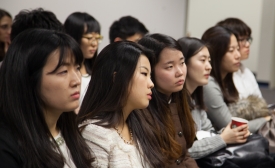china

This article evaluates three perceived public diplomacy outcomes related to education-based international exchanges.
CCTV America talks to Peter Shiao, founder of Orb Media Group about the future of increased China-Hollywood cooperation. Co-production and joint funding can be mutually beneficial—Chinese investment can get an expensive project started and stimulate the foreign film industry, while at the same time allowing Chinese funders a learning opportunity and adding to Beijing’s soft power reserves.
New Defense Ministry spokesman highlights importance of 'utmost sincerity' in key role. [...] He added that he and his team will conduct his mission with the utmost professionalism and give a broader introduction of the Chinese military to the outside world.
For the Chinese scholars at Eastern Mennonite University this semester, witnessing the difference between Chinese and American educational systems has been enlightening. [...] Eight are sponsored through Mennonite Partners in China (MPC), an exchange program that has been thriving in various formats since the early 1980s. The other two are on scholarship from the China Scholarship Council, a competitive, state-funded scholarship fund for research and study abroad.
Narendra Modi takes on Xi Jinping in a soft-power battle in America. “ANYTHING Xi can do, I can do better,” seemed to be the mantra of Narendra Modi, India’s prime minister, as he toured America in late September, hot on the heels of China’s president, Xi Jinping.
Security experts often disagree when ranking America’s security challenges, but most believe that the top three are violent Islamic extremism, Russia and China. These adversaries or potential adversaries have radically different capabilities and goals, but share one characteristic: All seem to be beating the United States on what can be called “the battlefield of perception.”

PD News headlines this week explored the power of visual storytelling.
In 1999, the first Starbucks café opened in China. The Seattle-based coffee chain, the world's largest, now operates a network of 1,500 shops across China, which is now its second-most-important market after the US [...] But Starbucks is facing competition.







